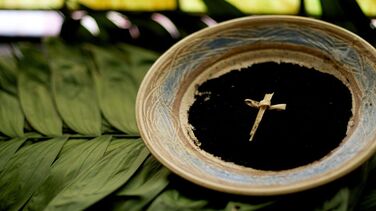 The good thing about a homily is it's intended to be short and when it comes to writing about death that's probably no bad thing. Today is Ash Wednesday and so, perhaps better than any other day of the year, a few words on the topic is appropriate. After all, death is the ultimate statistic and the reality none of us can avoid. I'd not started the day thinking I would write about death but this morning I was burning a few sticks to create ash for our service and the moment grabbed me. The flame reducing something that had form and shape into black ash did its job. As the scriptures say, 'For dust you are and to dust you will return.' I now have the sign of the cross marked on my forehead in that ash. Thinking of our mortality is something most of us prefer to avoid and society has engineered that avoidance with all the necessary distractions to ensure this happens. The reality however is far different. I'm a Pastor and so one of my privileges is to walk with people through difficult seasons of life - and this includes pain and loss. This past month has seen me officiate a funeral service, attend another one and engage a conversation where a young child unexpectedly lost a parent who was in their thirties. And that's just what is close to home. Like the rest of us I am at a loss to contemplate the horror of the earthquake affecting Syria and Turkey and numbed to almost indifference over the year long war in Ukraine. Death is all around us. So what are we to make of this reality called death that casts a long shadow over our lives? The writer of the book of Ecclesiastes says, 'I have seen the burden God has laid on the human race. He has made everything beautiful in its time. He has also set eternity in the human heart; yet no one can fathom what God has done from beginning to end. (Ecclesiastes 3:11-12)' Credited by many scholars to be written by King Solomon here we have a man trying to wade through his own fate and make sense of the life he has been given. Personally, the comment: 'He has also set eternity in the human heart' offers a clue, a lens through which to consider our mortality. Death's entrapment can of course leave us in the grip of fear - and as such weigh heavy on how we live out our existence here on earth. We have one life and as such desire to protect it: over protect it even. The writer of Hebrews puts it well. In speaking of Jesus and his accomplishment in the world it says: 'Since the children have flesh and blood, he too shared in their humanity so that by his death he might break the power of him who holds the power of death—that is, the devil— and free those who all their lives were held in slavery by their fear of death. (Hebrews 2:14-15)' There's something very robust in these comments - death meets its match in Jesus and in overcoming it throws darkness into disarray. Back to the ashes, I'd omitted to mention that creating them came off the back of viewing lasts nights Panorama programme Ukraine's War Diaries whereon a young guy who previously lived, in his own words, a self-obsessed life is now given to rescuing people from the front line and putting his own life in grave danger in the process. His conclusion? With tears in his eyes, he says the threat on his own life to save others has made him a better person! Living closer to death has caused him to be more alive. Which is what reverence for our mortality is meant to do, right? To make us braver; less fearful - humbler. To coat us not in Teflon but in grace; to realize that each day offered is a gift - and that gifts are always best when given rather than received. Or, as someone once said, 'Greater love has no one than this: to lay down one's life for one's friends. (John 15:13)'
2 Comments
25/12/2023 12:24:12 pm
"Headbanging through the realms of metal on Metal Archives Forum, where the music speaks louder than words!"
Reply
Leave a Reply. |
Author
Archives
December 2022
Categories
All
|
 RSS Feed
RSS Feed
